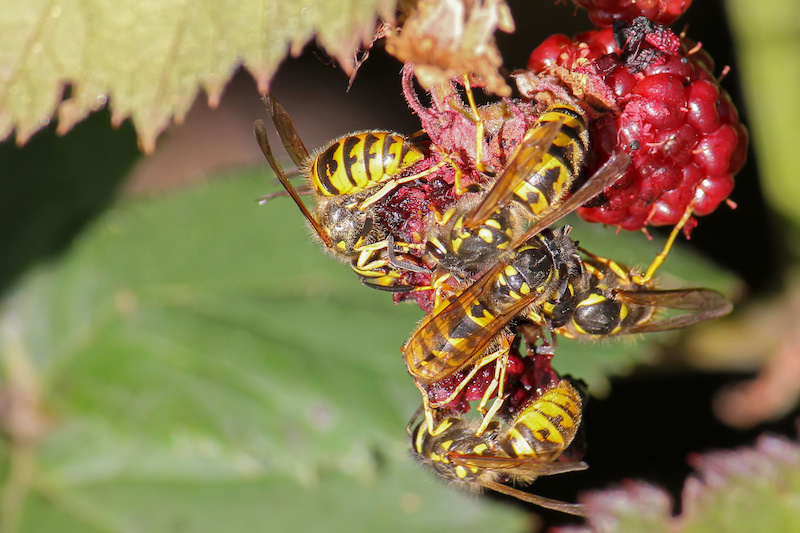Family Owned Pest Control in Washington & Utah
License # 101704
- officestaff@zunexpestcontrol.com
- License # 101704
Yellow jackets aren’t just annoying picnic crashers. They’re opportunistic eaters with a pretty varied diet. If you’ve ever had one buzz a little too close to your burger, you know they aren’t picky!
So, what do yellow jackets eat, and why do they seem to love your backyard BBQ so much? Let’s dive into their menu.
Like bees, yellow jackets are a common garden pest whenever crops begin to bloom during the summer or early fall.
But spoiler alert: They’re not bees. While you might mistake them for bees because of their bold yellow-and-black stripes, yellow jacket insects are actually wasps. Unlike bees, they have sleek, slender bodies and can sting repeatedly without losing their stinger. Yep, they’re built for battle.
Despite their bad reputation, yellow jackets do have a sweet tooth. They flock to your garden when crops start blooming from summer through early fall, hunting for nectar, pollen, fruit, and berries to fuel their buzzing chaos.
Here’s what’s on the yellow jacket menu:

Pollen and nectar are important components of a yellow jacket’s diet. They dart from flower to flower, guzzling nectar and even spreading a little pollen along the way. But their love for sweet stuff doesn’t end there.
Ripe fruit and berries are a major draw. Fallen, decaying fruit on the ground? That’s basically a buffet for yellow jackets. And if you’re growing juicy peaches or strawberries, don’t be surprised if you catch one of these pests tunneling through your produce for a sugary snack.
Occasionally, yellow jackets may dine on garden pests like aphids or caterpillars, but they primarily consume insects to redistribute back to developing larvae, according to Clemson University's Agricultural Extension.

Yellow jackets might have a sweet tooth, but insects are a crucial part of their diet, especially when it comes to feeding their larvae. While adults enjoy nectar and fruit, they actively hunt insects and other meat to keep their young well-fed.
Adult wasps catch insects, chew them up, and deliver the prepped meal back to the larvae. However, larvae aren't just passive recipients! After digesting their insect meal, yellow jacket larvae produce a sweet secretion or waste that adult yellow jackets regularly consume. It’s a win-win system that keeps the whole colony energized.
Yellow jackets aren’t fussy hunters. They’ll go after garden pests like aphids and caterpillars, but they can also target helpful insects. Known for their aggressive nature, yellow jackets are particularly detrimental to other stinging insects like bees. Nearby bee hives may fall victim to a yellow jacket attack because the wasps will gut an active bee colony to feed their own young when food is scarce.
Look at this video of a group of yellow jackets attacking a beehive!
While they prefer to feast on fruit or nectar, yellow jackets may occasionally turn toward insects as their next meal, especially as flowers and berries become scarce in late fall or the beginning of winter. Reduced food sources may also cause them to look for other measures to get their nutritional fill, like your next backyard event.

When yellow jackets can’t find their usual food sources, they’re quick to crash your outdoor fun. Backyard parties have many delectable treats like sugary drinks, fruit, hot dogs, hamburgers, or steak. As you sit down to dig into a full plate, you may find a yellow jacket trying to sneak a bite too!
While they’re not as interested in your cooked meat, they might grab a piece to carry back to the colony or even munch on it themselves if they’re desperate. Take a look at these yellow jackets cutting up and eating meat.
Barring your cooked ribs, yellow jackets consume any sweet substances on your picnic table. No cut fruit is safe when you have an active yellow jacket hive nearby! If left uncovered, your watermelon, cantaloupe, peaches, oranges, or mixed berries could attract yellow jackets to visit. Finding one of these pests burrowing into your fruit is enough to make you lose your appetite.
Many sweet drinks are common yellow jacket attractants, too. Open soda or alcohol cans can entice a yellow jacket to slip inside for a sip. If you’re not careful, you may come eye to eye with one of these pests the next time you raise your glass.

Keeping yellow jackets away from your yard doesn’t have to be a headache! A few simple steps can make all the difference. Here’s how to keep yellow jackets from turning your backyard into their buffet:
Avoid leaving uncovered food on your lawn to keep these pests at bay. If you’re enjoying an afternoon picnic, keep an eye out for buzzing insects and keep your food and drink covered and out of reach.
Decaying produce attracts yellow jackets looking for a sugary meal. While you may not be able to stop them from snacking on ripe fruit still on the tree, clearing the ground helps cut down their numbers.
Yellow jackets often build their hives underground or in sheltered areas. Brush piles, leaf piles, and standing water are all potential attractants. Keep your yard clear of debris and eliminate standing water to discourage these pests from settling in.
Preventative measures are helpful, but nothing beats professional pest control when you’re dealing with an active hive. Yellow jackets shouldn’t ruin your fun outside. Whenever these pests take up space on your lawn, give us a call!
Zunex can remove any dangerous yellow jackets from your yard and help you enjoy your time outdoors again. Contact us today to learn more!
